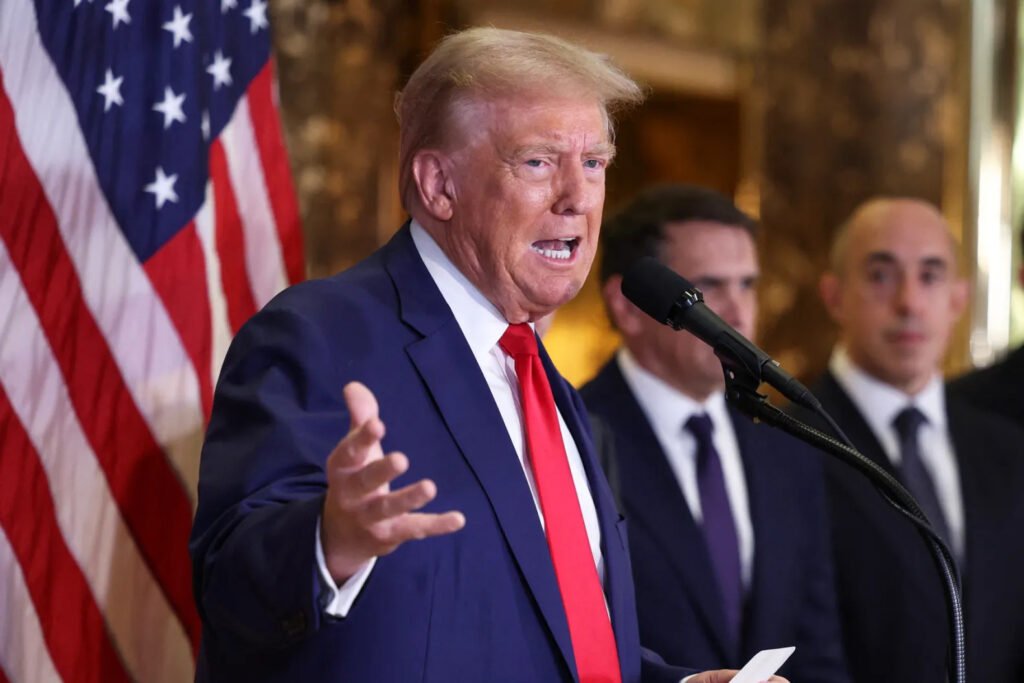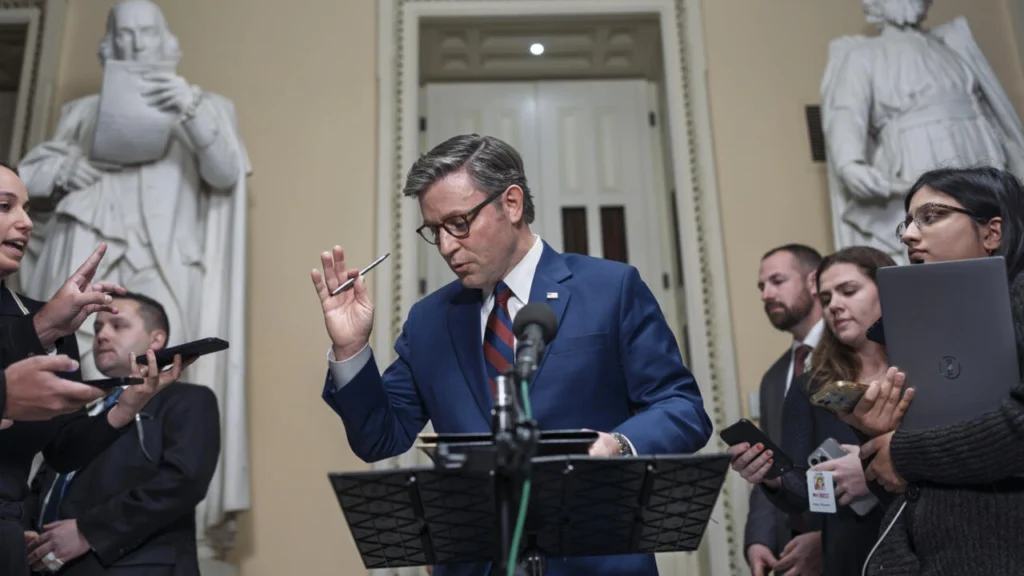The US House of Representatives has shot down a funding measure endorsed by President-elect Donald Trump, moving the country a little closer to a government shutdown this weekend.
An updated budget plan did not pass the two-thirds threshold in the lower chamber of Congress, 38 Republicans voted against the bill on Thursday night in defiance of the president-elect.
Trump had blocked a previous bipartisan funding agreement that the Republican House leadership had negotiated with the Democrats after the internet billionaire Elon Musk heavily criticized the requirement.
Republican House Speaker Mike Johnson said he will find another solution before government funding expires at midnight on Friday after the bill was defeated by 174 to 235 votes.
The Trump-approved replacement bill would have attached government funding to a two-year freeze on the federal debt limit which shows how much the government is allowed to borrow in order to meet its obligations.
Republican rebels were against it because they are against any kind of government spending while Democrats also voted against it, they said that the extra borrowing would be used to provide tax cuts to the affluent sector.
Here are five things to know about the possible government shutdown:
How we got here
The now looming government shutdown can be traced back to September, when another budget deadline was due.
Johnson was unable to approve a six months funding increment. Opponents that voted for the extension were mostly Democrats, which included a measure (the SAVE Act) to prove the citizenship in order to vote.
Instead, both the chambers of Congress agreed on a skeletal bill which would fund the government only till 20 December.
The bill would have provided federal funding until March 14 – almost three months after Trump is due to be back in the White House.
This was in addition to over $110 billion in emergency disaster relief and $30 billion for farmers; the first raise in lawmakers’ salaries in seven years; federal monies to reconstruct a bridge in Baltimore that had been demolished; healthcare; and, against deceptive advertising by hotels and other live event facilities.
Some Republicans complained Mr Johnson had dropped a simpler financial measure, directly vilifying elements deemed leftist which were added to secure Democratic backing.
Johnson defended the deal, attributing certain of the extra measures required to ‘acts of God’ such as disaster and farm subsidies.

Pentagon chief Trump, Tesla’s Musk support two-party scheme
However, the opposition for Johnson’s spending deal emerged on Wednesday.
Musk who Trump has appointed to look at expenditure reductions by co chairing the Department of Government Efficiency (which is not a real department) has been vociferously campaigning against the existing deal through posting of numerous tweets on X.
He labelled it ‘criminal’ and often quoted lies on the bill in his posts.
Musk said on X that any lawmaker that votes for this outrageous spending bill deserves to be voted out in 2 years.
After this, Musk rallied some opposition for the spending bill, Donald Trump and JD Vance, the incoming vice-president, finished the job by killing Johnson’s deal that same evening.
Both said in a joint statement that they wanted simple legislation without the Democratic-backed provisions that Johnson had included.
They also urged Congress to increase or revoke the debt ceiling, which sets the borrowing limit of the government to meet its obligations, and restrict the spending bill only to a temporary one and in response to disasters.
They referred to anything else as a betrayal of the country.
What happens next
Johnson and House Republicans presented the simplified bill on Thursday and it was voted down later that same day. That is the big question that the public may not know the answer to, as to what they will do next?
Members of Congress are not likely to vote again on Thursday, which means they will come back on the Friday morning with little over 24 hours to avoid a shutdown.
And one can easily infer that the blame game has already started and is purely partisan in nature. After the Thursday bill was defeated, Johnson said that it is unfortunate for America that almost all the House Democrats rejected it.
“It is, I think, really irresponsible of us to jeopardize a shutdown over these issues on matters that they have agreed on he said.”
Johnson may for a need for Democratic backing especially as cracks for the bill started to emerge among members of his party this week.
But the Democrats are unlikely to assist Johnson in endorsing a new funding bill, accusing him of violating the bipartisan deal.
“You make a deal with your colleagues across the aisle, you reap the whirlwind that ensues,” House Democratic Minority Hakeem Jeffries tweeted on X, founded by Musk.
And others appeared to mock Republicans for being seen to follow direction from the unappointed Mr Musk.
When speaking on the House floor on Thursday, Connecticut Representative Rosa DeLauro, the top Democratic appropriator in the House, jokingly referred to the billionaire as “President Musk.”
She said: ‘President Musk said ‘don’t do it, shut the government down.’
However, Johnson has to make Democrats vote for his spending bill and it is going to be tough since existing anger within his own party is going to intensify.
Time is also of the essence. These negotiations often takes several weeks.
This paper analyzes the repercussions in the event that a government shuts down
Annual funding is the major way through which federal agencies are financed. These agencies have to cease non-essential activities when the Congress does not pass 12 spending bills that constitute the spending budget.
They include functions that are basic to society such as border protection, in-hospital medical care, law enforcement and air traffic control.
But many federal employees may go without pay.
When social security and Medicare checks are being processed, benefit verification and card providing ceases. SNAP is financed obligatorily, whereas the food stamp benefits might be affected in case of a shutdown. This could result to a drag to other assistance related programmes.
Other agencies shut down completely.
The Food and Drug Administration suspend food safety check, the Environmental Protection Agency suspend inspection and National Parks are closed to the public.

The implications of the rerun for Republicans
This was the first big test of Trump’s hold over current congressional Republicans, and sources say that in the vote on Thursday, some of them rebelled.
It also presents a threat to Speaker Johnson because in 15 days the House will be voting on who will be the House Speaker for the next Congress.
This is appearing less and less like a sure-fire job for Johnson, although earlier it seemed that he had everything in place for this job.
Having been criticised by Trump and Mr Musk, the Louisiana Republican is now in trouble among his own over his administration of government subsidies.
Some Republicans have said that they will not support Johnson to become the leader of that chamber. He cannot afford to alienate several Republicans, most especially that the party has a bare majority of only five in the next Congress.
Republicans have in the past and the threat they posed to Johnson was real and can not be over emphasized.
To be elected Speaker of the House, California Republican Kevin McCarthy was forced to undergo 15 ballots in January 2023.
Less than a year later he was bounced by the Republicans who accused him of not slashing enough on spending and for going against his party to prevent a government shutdown.



